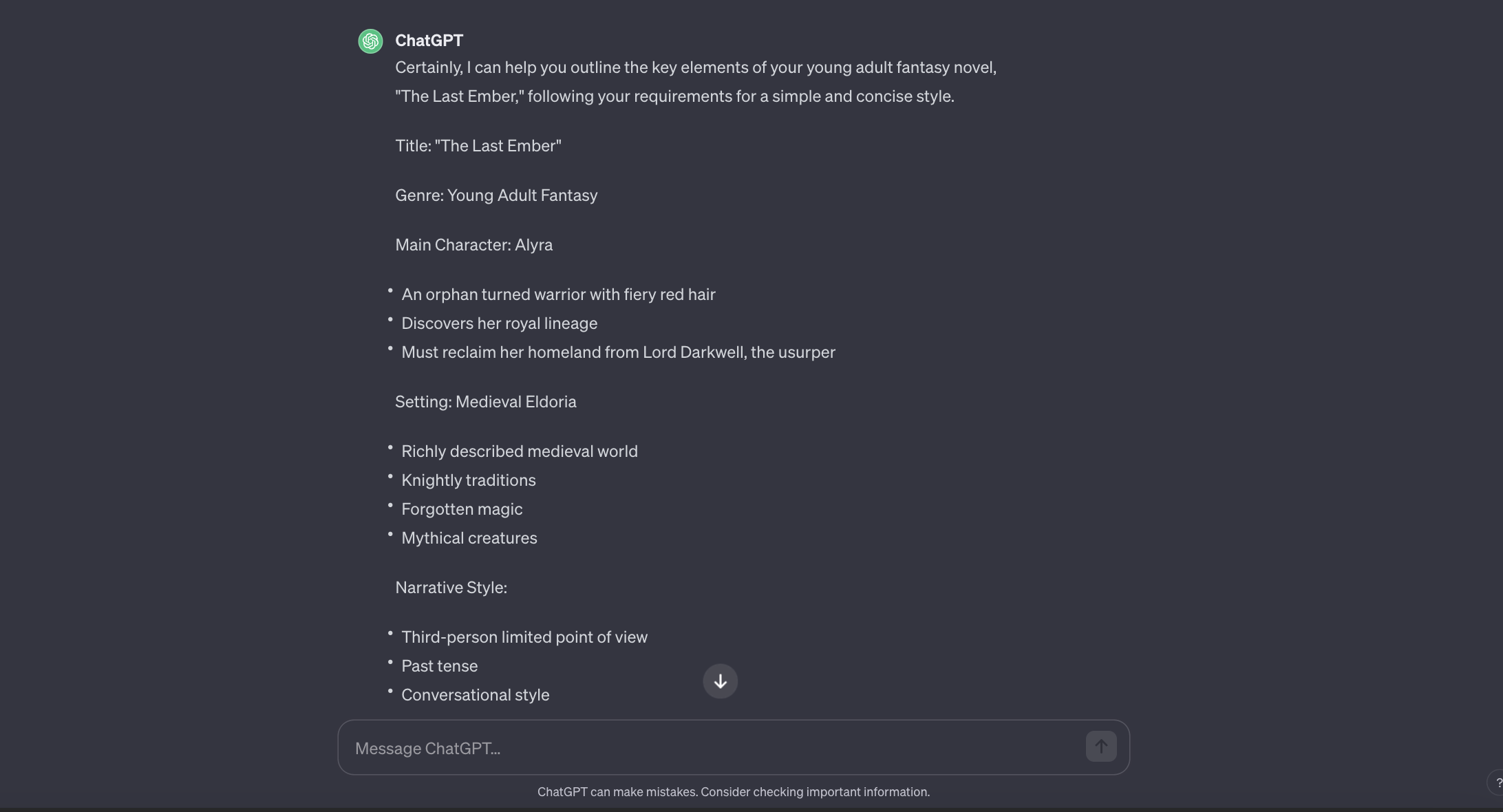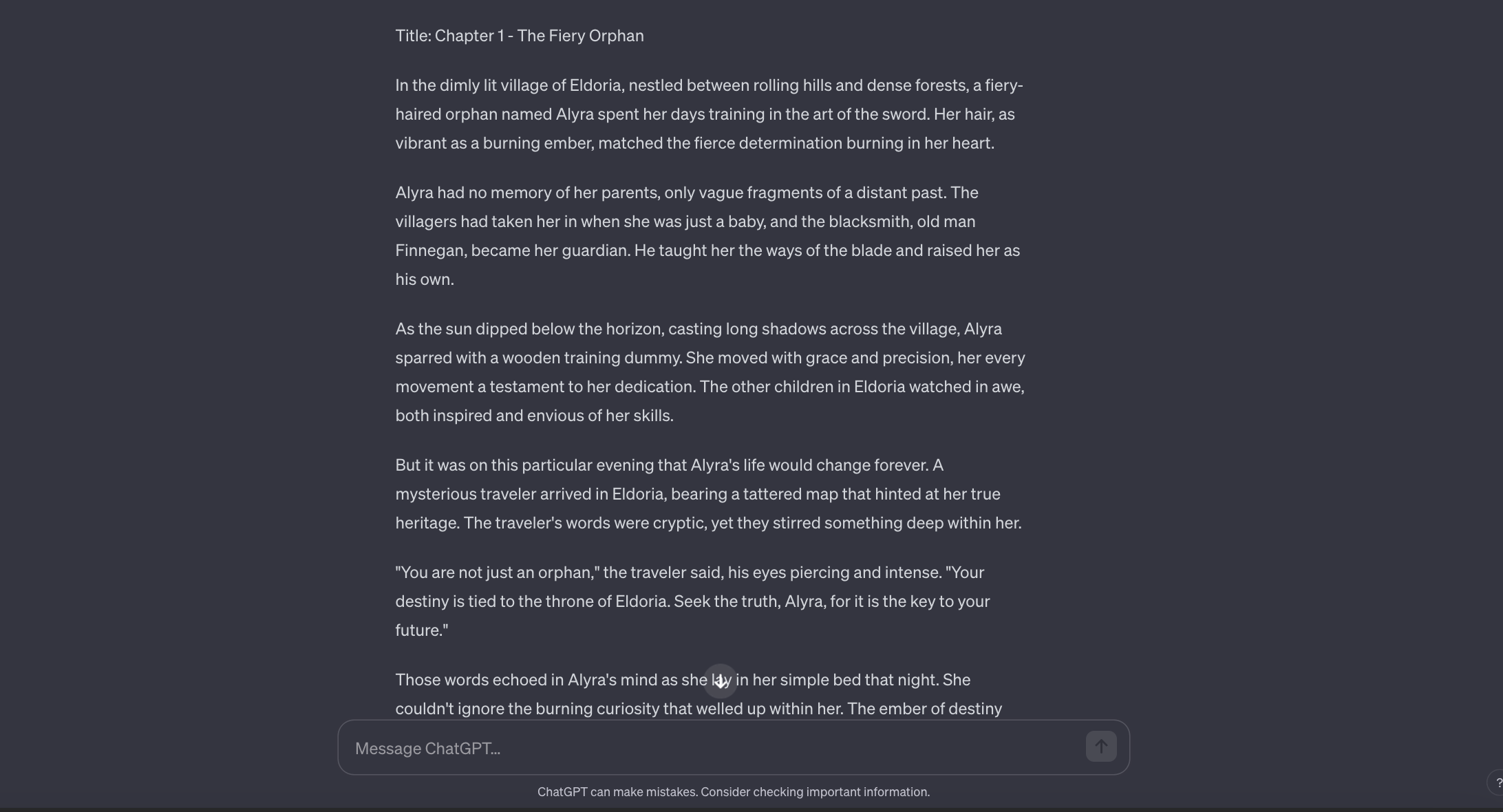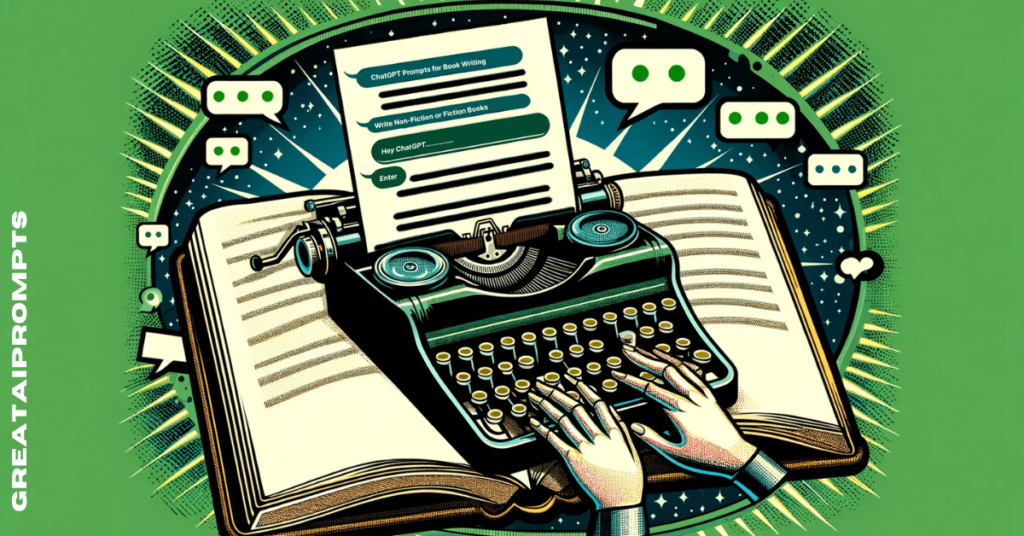Embarking on the journey of writing a book can be a thrilling adventure, especially in today’s age where technology has made it easier to enhance your writing skills and overcome any creative blocks.
Today, we will explore how ChatGPT can assist authors in crafting better books, outlining their stories, and more using innovative prompts.
For those unfamiliar, ChatGPT is an AI-driven language model developed by OpenAI. It serves various purposes such as answering questions, composing emails, articles, code, and providing writing suggestions and feedback.
Statistics indicate that ChatGPT has garnered 180.5 million users worldwide, with a weekly user base of 100 million individuals, including 92% of Fortune 500 companies.
With such widespread usage, book writers can also leverage ChatGPT in numerous ways.
Curious to learn more about how ChatGPT can benefit authors?
Let’s dive in!
Can You Write a Book Using ChatGPT
Absolutely.
ChatGPT serves as a robust AI tool that can assist you in generating ideas, drafting sections, and even refining your writing. Individuals utilize it to craft stories, articles, and more.
When it comes to writing a book, ChatGPT can guide you from the initial brainstorming phase to the final touches. It can help in developing ideas, creating outlines, drafting chapters, and enhancing the overall text.
While ChatGPT can be a valuable tool, it’s important to infuse your creativity and personal touch into your stories and books. Additionally, fact-checking and editing are crucial as ChatGPT may not always be entirely accurate.
Best ChatGPT Prompts for Authors (Book Writers)
Authors and bookwriters can utilize ChatGPT to delve into various book writing techniques without the need for extensive character development exercises, worldbuilding strategies, or exhaustive “How to Become an Author” guides.
With the following ChatGPT prompts, you can effortlessly craft sci-fi novels, develop character backstories, explore fiction and non-fiction genres, and engage in novel writing.
Our prompts encompass:
-
- Plot development prompts
-
- Dialogue writing prompts
-
- Genre-specific prompts
-
- Book marketing strategies
-
- And more…
Let’s delve into the various book writing workflows where ChatGPT can offer assistance and explore the prompts that can spark exceptional outputs.
ChatGPT Master Prompt for Book Writing
Introducing the master prompt or the system prompt for ChatGPT. System prompts in ChatGPT guide the AI’s conversational responses.
These prompts enable the AI to engage in conversations or pose queries to generate relevant and accurate outputs while staying focused on the topic at hand.
Here is the system prompt that serves as the primary guide for your ChatGPT chat to operate as a book writer:
ChatGPT System Prompt for Book Writers: Hey ChatGPT, assume the role of an experienced book writer with a track record of nearly 50 New York Times Best Sellers. Create a book incorporating the following details: Title: [Title] Genre: [Genre] Target Audience Age Group: [Target Audience Age Group] Writing Style: [Formal/Informal/Conversational/Other] Point of View: [First Person/Second Person/Third Person Limited/Third Person Omniscient] Tense: [Present/Past] Book Type: [Fiction/Non-fiction/Memoir/Self-help/Other] Setting: [Time Period] and [Location] Main Characters: [Number of Main Characters], [Names], [Backstories], [Personalities], [Physical Appearances], [Motivations] Supporting Characters: [Number of Supporting Characters], [Names], [Roles in Story], [Backstories], [Personalities] Antagonists: [Names], [Backstory], [Motivation] Narrative Arc: [Introduction], [Rising Action], [Climax], [Falling Action], [Resolution] Themes: [Core Messages], [Moral of the Story] Conflict: [Type of Conflict - Man vs. Man/Man vs. Self/Man vs. Society/Man vs. Nature/Man vs. Technology] Plot Twists: [Key Plot Twists] and [How they affect the story] World-Building Details: [Political System], [Cultural Norms], [Geography], [Magic System/Technology] Climactic Event: [Description of Climactic Event] Ending: [Happy/Sad/Ambiguous] Subplots: [Number of Subplots], [Descriptions], [How they interlink with the main plot] Book Length: [Word Count Goal] Chapter Outline: [Number of Chapters], [Titles], [Key Events per Chapter] Research Topics: [Subject needing research] Tone: [Serious/Humorous/Satirical/Dark/Optimistic/Pessimistic] Imagery: [Descriptive/Minimalist], [Key Visuals] Dialogue Style: [Witty/Realistic/Formal/Informal/Archival] Writing Inspirations: [Favorite Books/Authors/Genres] Special Requests: [Any specific elements or directions for the book] Additional Notes: [Any other details or preferences] Deadline: [Time Frame for Completion]
Let’s populate the above prompt with sample data to see how it functions:
Complete ChatGPT System Prompt for Book Writers: Assist me in writing a young adult fantasy novel titled 'The Last Ember,' featuring Alyra, an orphan turned warrior with fiery red hair who discovers her royal lineage and must reclaim her homeland from Lord Darkwell, the usurper. The story is set in medieval Eldoria, with a third-person limited point of view, past tense, and a conversational style. It will include knightly traditions, forgotten magic, mythical creatures, and subplots involving espionage and political alliances. The book should have an optimistic tone, descriptive imagery, witty dialogue, and be inspired by epic sagas like 'A Song of Ice and Fire.' I aim to complete a 90,000-word manuscript within six months.
Here is the output generated by ChatGPT using the above prompt:

Upon proceeding to the first chapter of the book as suggested by ChatGPT, here are the results:

In this scenario, you could further enhance your characters or generate a comprehensive chapter outline as per your preferences.
The above prompt is an all-encompassing prompt, allowing you to acquire all necessary information with a single ChatGPT prompt, eliminating the need for individual prompts for each book writing aspect.
However, if you prefer to create book outlines, characters, and storyboards separately, here are the prompts tailored for each book writing workflow.
ChatGPT Prompt for Generating Book Outline
This prompt can kickstart your journey in crafting a detailed and captivating fiction or non-fiction story outline.
Looking to generate a book outline? Here’s a ChatGPT prompt to help you out:
Prompt:
“Create a detailed outline for a [Book Type] book titled ‘[Title]’, set in [Setting] during [Time Period], with [Number of Main Characters] main character(s) named [Main Characters’ Names] who are [Main Characters’ Descriptions]. The story should start with [Initial Event], followed by [Key Events] leading to a climax involving [Climax Event]. The narrative should resolve with [Resolution Event], ensuring themes of [Themes] are woven throughout, with subplots including [Subplots]. The tone should be [Tone] with a pace that is [Pacing]. Include chapters titled [Chapter Titles], each with a distinct purpose, such as [Purpose of Each Chapter], and ensure character development arcs for [Character Arcs]. Also, incorporate a conflict of [Type of Conflict], and ensure the book’s length is approximately [Word Count Goal] words.”
Example:
“Create a detailed outline for a Fiction book titled ‘The Whispering Shadows’, set in an ancient, enchanted forest during the age of myth and magic, with two main character(s) named Eliana and Corin who are a fierce warrior with a hidden power and a cunning sorcerer with a troubled past. The story should start with Eliana discovering a mysterious amulet, followed by a series of trials that test their abilities and resolve leading to a climax involving a confrontation with a dark entity that seeks to corrupt the forest. The narrative should resolve with the restoration of peace and the revelation of Corin’s true heritage, ensuring themes of courage, friendship, and the balance between light and dark are woven throughout, with subplots including Eliana’s quest to learn about her lineage and Corin’s struggle to overcome his inner demons. The tone should be adventurous and mystical with a pace that is steady and building towards intense moments. Include chapters titled ‘The Amulet’s Call’, ‘The Trial of Flames’, ‘Echoes of the Past’, each with a distinct purpose, such as introducing the magical world, challenging the heroes, revealing backstory, and ensure character development arcs for Eliana’s acceptance of her destiny and Corin’s redemption. Also, incorporate a conflict of Man vs. Supernatural, and ensure the book’s length is approximately 80,000 words.”
ChatGPT Prompt for Character Development
ChatGPT prompts for character development can incredibly benefit you as an author. You can explore different facets of your characters, such as their fears, desires, and internal conflicts, adding depth and authenticity to your storytelling.
Prompt:
“Develop comprehensive profiles for characters in a [Genre] story titled ‘[Title]’. For the protagonist(s) [Protagonist Names], detail their [Physical Traits], [Personality Traits], [Backstories], [Goals], and [Obstacles] they must overcome, leading to their [Character Arcs]. For the antagonist(s) [Antagonist Names], describe their [Motivations], [Strategies], and [Influences on the Protagonist]. Outline the supporting characters [Supporting Characters’ Names] with their [Roles in the Story], [Unique Characteristics], and [Impact on the Protagonist’s Journey]. Specify character motivations, highlighting [Internal/External Drivers] that propel them through the story. Detail character relationships, mapping out the [Interpersonal Dynamics] between characters, including [Alliances], [Rivalries], and [Romantic Entanglements]. Incorporate [Character Flaws] that add complexity and [Growth Opportunities]. Ensure that each character’s development supports the overarching [Theme(s)] of the story.”
Example:
“Develop comprehensive profiles for characters in a Fantasy story titled ‘Heart of the Ancients’. For the protagonist(s) Elena and Rowan, detail their sharp eyes and scarred hands, resourceful and skeptical nature, orphaned upbringing and mysterious lineage, to restore the ancient grove, and the empire’s soldiers and enchanted beasts they must overcome, leading to their realization of their true powers and heritage. For the antagonist(s) Lord Malifax, describe their quest for immortality, manipulation of political figures, and tempting Elena and Rowan with false promises of peace. Outline the supporting characters Mira the Seer, Bran the Shieldbearer, and Lysa the Swift with their guidance, protection, and scouting, wise yet cryptic insights, and impact on Elena and Rowan’s tactics and morale. Specify character motivations, highlighting Elena’s internal drive to belong and Rowan’s external push to prove his worth that propel them through the story. Detail character relationships, mapping out the friendship and emerging trust between characters, including the alliance with the forest spirits, rivalry with the imperial general, and Rowan’s unspoken love for Elena. Incorporate Elena’s naivety and Rowan’s recklessness that add complexity and opportunities for Elena to gain wisdom and for Rowan to find humility. Ensure that each character’s development supports the overarching themes of destiny, power, and unity in the story.”
ChatGPT Book Writing Prompt for Setting and Atmosphere
Using this prompt, you can create vibrant and evocative settings, set the mood, and establish the atmosphere that best suits your narrative.
Prompt:
“Construct a vivid setting and atmosphere for a [Genre] novel titled ‘[Title]’. Begin with the primary location [Primary Setting], detailing its [Geographical Features], [Climate Conditions], and [Cultural Significance]. Describe the time period, whether [Historical Era], [Future Setting], or [Fantasy World], and how it shapes societal norms and daily life. Define the broader world by including [Political Landscape], [Economic Conditions], [Religions and Beliefs], and [Technological Advancements] or [Magic Systems]. For secondary settings like [Villages/Cities/Other Planets], provide [Specific Details] that distinguish them and contribute to the narrative. Establish the mood by detailing [Common Local Legends], [Public Festivals], and [Daily Routines of Inhabitants]. Include sensory descriptions that encompass [Sights], [Sounds], [Smells], and [Textures] to immerse the reader fully. Elaborate on how the setting and atmosphere evolve with the plot, using [Environmental Changes] like [Seasonal Shifts] or [Cataclysmic Events] to reflect the story’s progression. Ensure the setting and atmosphere accentuate the [Themes] and [Mood] of the story and interact dynamically with the characters’ [Journeys and Transformations].”
Example of a Prefilled Prompt:
“Construct a vivid setting and atmosphere for a Post-Apocalyptic novel titled ‘Echoes of the After’. Begin with the primary location the ruins of New Eden, detailing its overgrown skyscrapers, harsh, rainy climate, and symbolism as a fallen utopia. Describe the time period as 2050s post-cataclysm, and how it shapes societal norms and daily life with scavenging, bartering, and survivalist culture. This could involve interacting with readers on social media, hosting events, or creating a newsletter to keep readers engaged.
- Promotions and Marketing: This section focuses on how to promote the book, considering the budget, timeline for the book launch, and opportunities for outreach. It could include strategies such as book signings, blog tours, or advertising campaigns.
- Publishing Avenues: This part of the prompt addresses whether the author will pursue traditional or self-publishing routes, as well as how to network with industry professionals to further their career.
- Marketing Materials: This section lists the materials needed for marketing, such as book covers, author photos, and promotional graphics, and suggests how to effectively use them in a marketing campaign.
By following this prompt, authors can create a comprehensive branding strategy to help promote their books successfully.
ChatGPT Prompt for Writing Book Blurbs
Writing an engaging and enticing blurb is crucial for attracting readers to your book. Using ChatGPT, you can generate compelling book blurbs that capture the essence of your story and entice potential readers.
Here’s the prompt for writing book blurbs:
“Craft a captivating blurb for a [Genre] book titled ‘[Title]’. The blurb should introduce [Protagonist] and their [Initial Situation] in [Setting], followed by the [Inciting Incident] that propels them into [Conflict]. Highlight the [Stakes] and the [Journey] the protagonist must undertake, teasing the [Twists] and [Resolution] without giving too much away. Use engaging language and descriptive phrases to create intrigue and excitement that will hook readers and make them want to read more.”
By following this prompt, authors can create compelling book blurbs that effectively summarize their stories and entice readers to pick up the book and start reading.
ChatGPT Prompt for Creating Book Titles
Choosing the right title for your book is essential for attracting readers and conveying the essence of your story. ChatGPT can help you brainstorm creative and catchy book titles that capture the essence of your book.
Here’s the prompt for creating book titles:
“Generate creative and catchy titles for a [Genre] book. The titles should reflect the tone and theme of the book, intrigue readers, and capture their attention. Consider keywords and phrases that are relevant to the story and appeal to the target audience. Aim to create titles that are memorable and enticing, drawing readers in and making them curious about the book.”
Using this prompt, authors can generate a list of potential book titles that resonate with their story and pique readers’ interest, helping them choose the perfect title for their book.
ChatGPT Prompt for Writing Book Reviews
Writing compelling book reviews can help authors generate buzz around their books and attract new readers. Using ChatGPT, authors can craft engaging and thoughtful book reviews that highlight the strengths of their books and encourage readers to pick them up.
Here’s the prompt for writing book reviews:
“Write a captivating book review for a [Genre] book titled ‘[Title]’. The review should summarize the plot and main themes of the book, highlight the strengths of the story, characters, and writing style, and explain why readers will enjoy the book. Include personal insights and emotional reactions to the book, and recommend it to potential readers. Use engaging language and descriptive phrases to capture the essence of the book and convince readers to pick it up.”
By using this prompt, authors can write compelling book reviews that showcase the strengths of their books and persuade readers to give them a try, ultimately helping to generate interest and sales.
To effectively promote a book, authors can engage with their audience by responding to comments, hosting giveaways, and regularly updating social media with relevant content. This helps to create a connection with potential readers and generate interest in the book.
For promotions and marketing, authors can plan strategies such as paid advertising, reaching out to book reviewers, or organizing a book launch event to attract more readers and create buzz around the book.
When deciding on publishing avenues, authors should consider whether to pursue traditional publishing or self-publishing and how to network with industry professionals to get their book out to a wider audience.
Creating marketing materials like book covers, author photos, and promotional graphics is essential for a successful marketing campaign. Authors need to utilize these materials effectively to grab the attention of potential readers and entice them to pick up the book.
In addition to these strategies, authors can use ChatGPT prompts for various use cases like exploring themes, setting scenes, creating conflicts, adjusting pacing, integrating backstories, developing subplots, describing characters, adding emotional depth, detailing sensory experiences, and naturalizing dialogue to enhance their writing and storytelling.
By incorporating these elements and utilizing ChatGPT prompts, authors can bring their book ideas to life with the help of AI technology. Let us know in the comments if there’s anything we missed, and be sure to check out our other resources for more writing tips and tools. Please rephrase.


